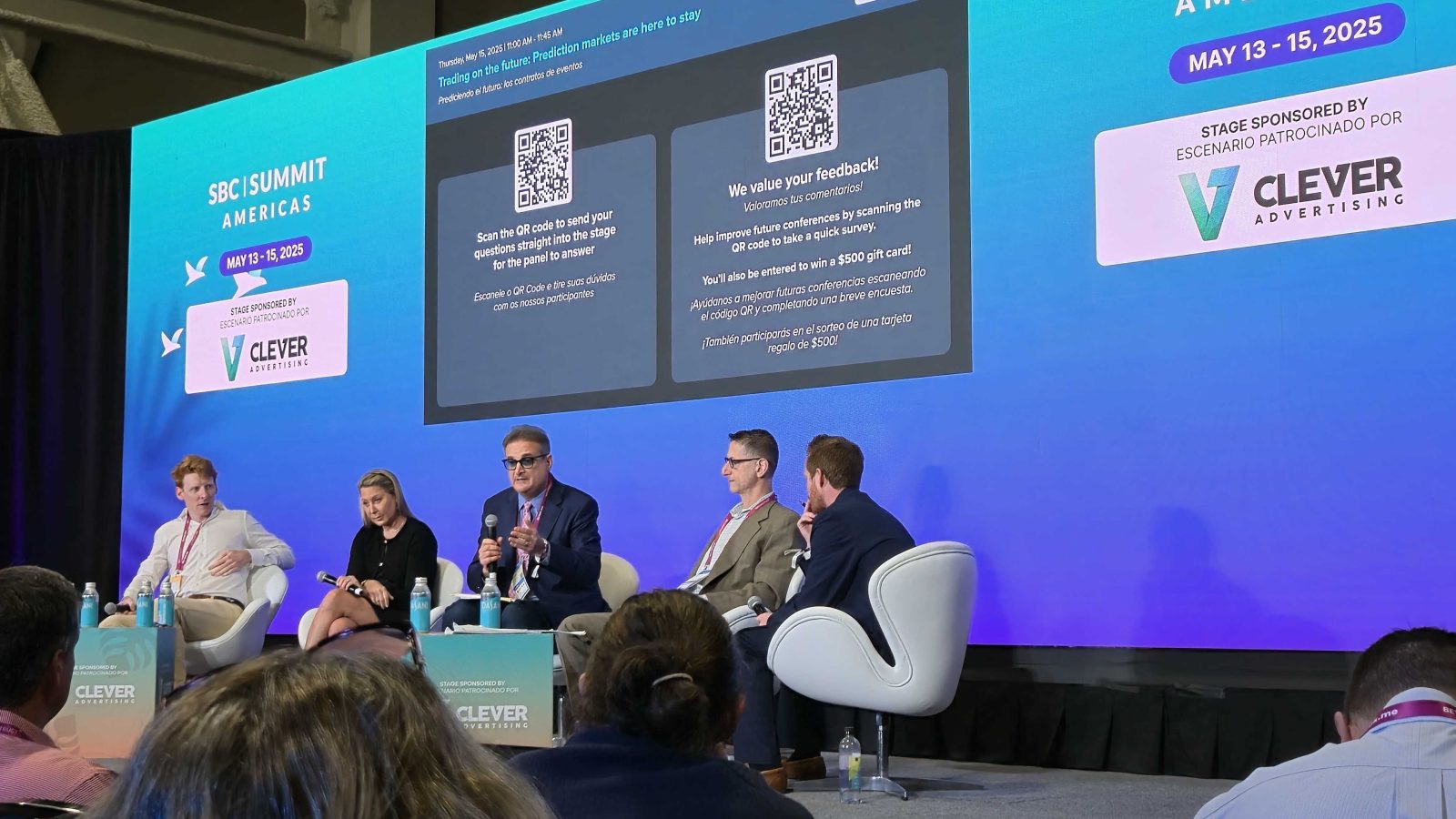Experts were divided on the legal status of sports event contracts – but agreed that they may struggle to take huge market share from traditional sportsbooks – at a May 14 panel at SBC Summit Americas 2025.
In a panel titled “Trading on the Future: Prediction Markets are Here to Stay,” moderated by Christopher Gerlacher of PredictionNews, experts sparred over the status of sports event contracts.
Sports event contracts are trades on the outcomes of a sporting event, offered by businesses such as Kalshi that are registered with the Commodity Futures Trading Commission (CFTC) to offer financial products.
Through a partnership with Kalshi, Robinhood started offering single-game sports event contracts. Markets are available for the NBA and NHL playoffs.
As the largest stock trading app in the U.S. by number of users, Robinhood is a major source of volume for Kalshi.
Authorities in states including Nevada, New Jersey, and Maryland have argued that these markets constitute illegal sports betting, and sent cease-and-desist letters to Kalshi. However, Kalshi has sued for injunctive relief in those states, allowing it to keep offering these markets.
During the panel, Melissa Blau, CEO of iGaming Capital, said that many of her clients still had little knowledge of prediction markets. Those who were more aware of the sector, she added, still weren’t able to do much about its rise.
“Most are not knowledgeable,” she said. “But the problem is the ones that do know, they can’t do anything about it. They’re not allowed to do it, but they have to watch everyone else be able to do it, and they have to just sit idly by and watch their addressable market shrink and shrink and shrink.
“And so the question becomes, what can we do about it while this works itself out in the courts?”
David Aron, counsel at Jones Day, noted that Brian Quintenz – the nominee for chair of the Commodity Futures Trading Commission (CFTC) and a Kalshi board member – appears set to allow sports event futures to continue to be offered. Quintenz is awaiting a hearing from the Senate Committee on Agriculture, Nutrition, and Forestry on his nomination.
“It seems unlikely that he’s going to prevent exchanges from listing sports events contracts if he gets confirmed as CFTC chairman, which it seems likely he will,” Aron said. “He doesn’t seem inclined to do anything unless the court cases start going the other way, or he gets pressure from Congress, or the CFTC itself gets sued.”
Illegal sports betting, or something else?
Dan Wallach of Wallach Legal, LLC was strongly opposed to the idea that sports event contracts are a legal product. He argued that multiple federal laws governing gaming make it clear that a business like Kalshi should not be permitted to offer sports contracts.
“It’s fitting that we have this panel today in the state of Florida, where the Seminole Tribe of Florida enjoys a statewide exclusivity over sports betting, protected by a federal law known as the Indian Gaming Regulatory Act,” he said.
“And against the backdrop of this federal exclusivity, Kalshi comes along and claims that a different federal law overrides IGRA, overrides the Wire Act, and overrides PASPA. Folks, there is no congressional authorisation for sports-related event contracts, at least not from my lens.”
Alex Kane, CEO of Sporttrade – a sports betting exchange operator that is seeking a CFTC license to be regulated as a prediction exchange – disagreed. He said that the similarities between the two products were only superficial.
“The only thing they have in common is that you’re risking money to win money, and it involves sports: that I will give you,” he said. “But there is no other, there is no other thing that is similar, or exactly the same, or congruent between what DraftKings offers and what someone like Sporttrade offers.”
Business model challenges
Much of the discussion looked at the question of sports event contracts as a business model, with panelists pointing out that there are reasons to think prediction markets may not heavily eat away at sportsbooks’ market share.
Blau brought up the example of UK-based Betfair, which launched in 2000 and in early marketing claimed its arrival heralded “the death of the bookmaker.” However, the business struggled to eclipse major sportsbook operators in market share, before merging with traditional sportsbook Paddy Power to form the business that would later become Flutter Entertainment.
“Historically, the exchange model was a great model, and I think for those of us who’ve been in this industry for so long, a lot of people, the bookmakers in Europe, were fearful of Betfair for the longest time, and that fear turned out not to be as bad as they thought it was going to be, because Betfair always ended up with a five percent market share,” Blau said. “So it’s a nice niche product, it’s a needed market product, but it is what it is.”
Kane noted that sports event futures were not necessarily a threat to regulated sportsbooks, because there was not a reliable and user-friendly way to offer parlays, which are the most lucrative bets for traditional sportsbook operators, at a similar margin to the sportsbooks.
“If an exchange promotes one big, juicy parlay, one market maker offers it at a 15% edge, and then I come in and say ‘That’s a great deal, I’ll offer it at 13% edge,’ and then the next market maker comes in, and we grind each other down to where the hold is sub-tenth of a percent,” he said.
‘Blanket prohibition?’
A major point of dispute in the conversation was exactly what the CFTC says with regard to gaming contracts. Wallach referred to a “per se blanket prohibition against event contracts that involve, relate to, or reference the following categories: terrorism, war, illegal activity, gaming.”
However, Kane said that wasn’t quite true.
“It’s a two-part test,” he said. “Do they involve gaming? And are they within public interest? So it is not a blanket prohibition”
Kane argued that the public interest may go beyond aspects such as hedging risk, and could instead also include the interest of people who wish to bet, but do not have access to regulated options, or face high prices from monopolies.
The exact text of the CFTC’s rules is somewhere in between the two interpretations. The U.S. Code on event contracts says the commission “may determine that such agreements, contracts, or transactions are contrary to the public interest” if they involve terrorism, war, illegal activity or gaming.






